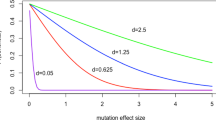Abstract
Natural selection explains how living forms are fitted to theirconditions of life. Darwin argued that selection also explains what hecalled “the gradual advancement of the organisation,” i.e.evolutionary progress. Present-day selectionists disagree. In theirview, it is happenstance that sustains conditions favorable to progress,and therefore happenstance, not selection, that explains progress. Iargue that the disagreement here turns not on whether there exists aselection-based condition bias – a belief now attributed to Darwin – but on whether there needs to be such a bias for selection to count as explaining progress. In Darwin's own view, selection explained progressso far as more complex organisms have the selective advantage whenselection operates unimpeded. I show that these two explanations ofevolutionary progress, selection and happenstance, answer for theirobjectivity to different standards, and for their truth or falsehood todifferent features of the world.
Similar content being viewed by others
References
Barrett, P. H., Weinshank, J. and Gottleber, T. T. (eds): 1981, A Concordance to Darwin's Origin of Species, First Edition, Cornell University Press, Ithaca.
Barrett, P. H., Gautrey, P. J., Herbert, S., Kohn, D. and Smith, S. (eds): 1987, Charles Darwin's Notebooks, 1836–1844, British Museum (Natural History), Cambridge University Press, Cambridge, UK.
Bowler, P. J.: 1993, Biology and Social Thought: 1850–1914, Office for History of Science and Technology, Berkeley.
Burkhardt, F., Porter, D. M., Browne, J. and Richmond, M.: 1993, The Correspondence of Charles Darwin, vol. 8, Cambridge University Press, Cambridge, UK.
Burkhardt, R.W., Jr.: 1977, The Spirit of System: Lamarck and Evolutionary Biology, Harvard University Press, Cambridge, USA.
Crombie, A. C.: 1994, Styles of Scientific Thinking in the European Tradition: The History of Argument and Explanation especially in the Mathematical and Biomedical Sciences and Arts, 3 vols., Duckworth, London.
Darwin, C.: 1959, The Origin of Species by Charles Darwin: A Variorum Text, Morse Peckham (ed.), University of Pennsylvania Press, Philadelphia.
Darwin, F. and Seward, A. C. (eds): 1903, More Letters of Charles Darwin, 2 vols., John Murray, London.
Dawkins, R.: 1982, The Extended Phenotype, W.H. Freeman, Oxford.
Depew, D. J. and Weber, B. H.: 1995, Darwinism Evolving: Systems Dynamics and the Genealogy of Natural Selection, Bradford Books/MIT Press, Cambridge, USA.
Di Gregorio, M. A.: 1990, Charles Darwin's Marginalia, vol. 1, Garland Publishing, London.
Gould, S. J.: 1996, Life's Grandeur: The Spread of Excellence from Plato to Darwin, Jonathan Cape, London (published in the USA as Full House).
Hacking, I.: 1990, The Taming of Chance, Cambridge University Press, Cambridge, UK.
Hacking, I.: 1992a, ‘“Style” for Historians and Philosophers’, Studies in History and Philosophy of Science 23, 1–20.
Hacking, I.: 1992b, ‘The Self-Vindication of the Laboratory Sciences’, in A. Pickering (ed.), Science as Practice and Culture, University of Chicago Press, Chicago, pp. 29–64.
Hacking, I.: 1992c, ‘Statistical Language, Statistical Truth and Statistical Reason: The Self-Authentification of a Style of Scientific Reasoning’, in E. McMullin (ed.), Social Dimensions of Science, Notre Dame University Press, Notre Dame, pp. 130–157.
Hodge, M. J. S.: 1977, ‘The Structure and Strategy of Darwin's “Long Argument”’, British Journal for the History of Science 10, 237–246.
Hodge, M. J. S.: 1987, ‘Natural Selection as a Causal, Empirical, and Probabilistic Theory’, in L. Krüger, G. Gigerenzer and M. S. Morgan (eds), The Probabilistic Revolution, vol. 2, Bradford Books/MIT Press, Cambridge, USA, 233–270.
Hull, D. L.: 1988, ‘Progress in Ideas of Progress’, in M. H. Nitecki (ed.), Evolutionary Progress, University of Chicago Press, Chicago, pp. 27–48.
Koertge, N.: 1977, ‘Galileo and the Problem of Accidents’, Journal of the History of Ideas 38, 389–408.
Kuhn, T.: 1970, The Structure of Scientific Revolutions, 2nd ed., University of Chicago, Chicago.
Lamarck, J. B.: 1984, Zoological Philosophy: An Exposition with Regard to the Natural History of Animals, trans. H. Elliot (1914) from the French original (1809), University of Chicago Press, Chicago.
Leakey, R. E. (ed.): 1979, The Illustrated Origin of Species by Charles Darwin, Faber and Faber, London.
Levins, R. and Lewontin, R.: 1985, The Dialectical Biologist, Harvard University Press, Cambridge, USA.
Malthus, T. R.: 1970, An Essay on the Principle of Population and A Summary View of the Principle of Population, A. Flew (ed.), Penguin, London.
McShea, D. W.: 1991, ‘Complexity and Evolution: What Everybody Knows’, Biology and Philosophy 6, 303–324.
Nitecki, M. H. (ed.): 1988, Evolutionary Progress, University of Chicago Press, Chicago.
Ospovat, D.: 1981, The Development of Darwin's Theory: Natural History, Natural Theology, and Natural Selection, 1838–1859, Cambridge University Press, Cambridge, UK.
Porter, T. M.: 1986, the Rise of Statistical Thinking: 1820–1900, Princeton University Press, Princeton.
Richards, R. J.: 1988, ‘The Moral Foundations of the Idea of Evolutionary Progress: Darwin, Spencer, and the Neo-Darwinians’, in M. H. Nitecki (ed.), Evolutionary Progress, University of Chicago Press, Chicago, pp. 129–148.
Richards, R. J.: 1992, The Meaning of Evolution: The Morphological Construction and Ideological Reconstruction of Darwin's Theory, University of Chicago Press, Chicago.
Ruse, M.: 1996, Monad to Man: The Concept of Progress in Evolutionary Biology, Harvard University Press, Cambridge, USA.
Author information
Authors and Affiliations
Rights and permissions
About this article
Cite this article
Radick, G. Two Explanations of Evolutionary Progress. Biology & Philosophy 15, 475–491 (2000). https://doi.org/10.1023/A:1006609532691
Issue Date:
DOI: https://doi.org/10.1023/A:1006609532691




